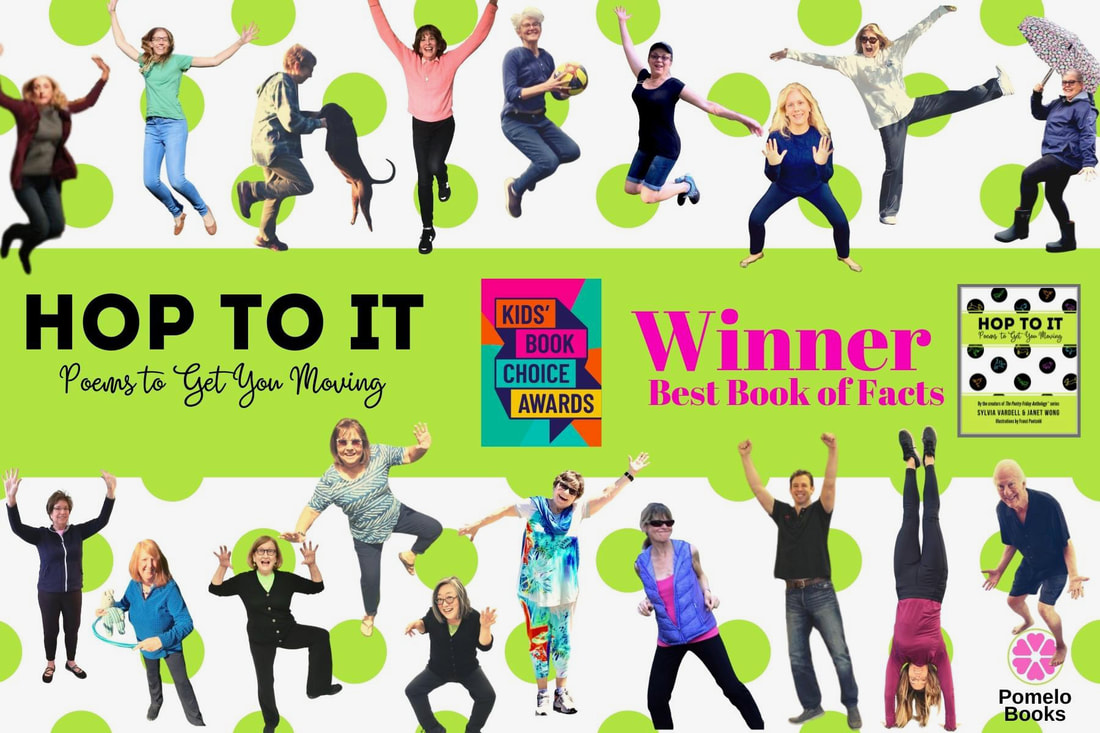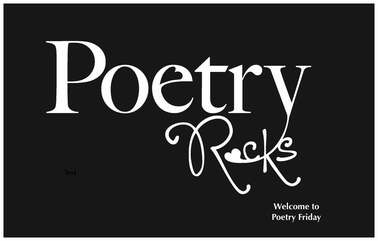 Graphic Design by Amber Fleek Graphic Design by Amber Fleek
Jama at Jama's Alphabet Soup has Poetry Friday hosting duties today. She's cooking up a delicious Thanksgiving parody poem. Plus she always has the most scrumptious food photos.
Today I have an interview with Rebecca Brock, author of an adult collection of poetry, Each Bearing Out. I "met" Rebecca in Laura Shovan's February Poetry Group on Facebook. She just published this wonderful collection about motherhood and the natural world. 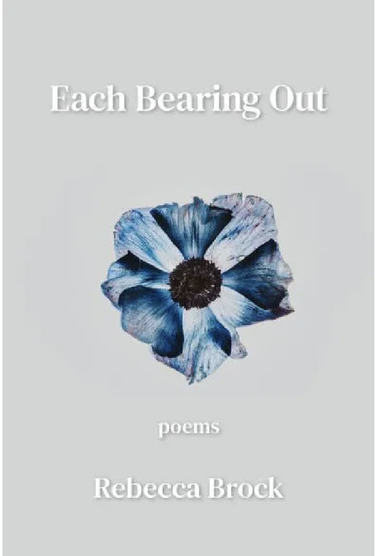
JRM: What was the process that led you to create Each Bearing out? Did you set out to write a
collection or did you write poems and then one day realized that there was a collection? I noticed that several poems found homes in journals first. RB:Thank you, Jone, for reaching out to me and sending me these questions. So much of this journey for me has been one of permission. I was finally writing again, after a long silence, and it took me a while to acknowledge to myself that I was writing poetry. I hadn’t written poetry since my undergraduate years—I studied fiction in graduate school and had only ever published in nonfiction. But I was writing a lot of poems I referenced as my “mom poems.” They felt very personal, like small snapshots caught from the blur. Eventually, I had so many that I began to think about making a small book. JRM: Have you always been interested in the natural world? I noticed you are originally from Idaho. How did growing up in Idaho play a part in your writing life? RB: I grew up in Boise, Idaho but moved away over twenty years ago. I’d always planned to go back, but life gets complicated and that distance between my original home and my home now informs a lot of my writing. I think my interest in the natural world has grown deeper through my experience of mothering. My kids were curious, input seeking creatures and seeing the world through their eyes is what’s really brought me back to noticing, and paying attention to the natural world. JRM: I was really struck by the poem “Good Housekeeping”. I struggle with keeping house, writing and being engaged with my family. Add the concerns about the environment, it really gets overwhelming. What is one event that led you to write that poem? RB: “Good Housekeeping” resonated with a lot of my friends who have been busy mothering through these last years. It was originally published with the tag line “America during Covid, during Trump.” There has been such a constant tumult these last several years—political, social, environmental. I would be trying to do the most ordinary thing like decorate for Halloween or vacuum and just feel this redundant dread, as if I were participating in a great pretending that lets us go on believing everything is fine. The question, for me, is still a constant—how do we mother these children toward a future we can’t even begin to fathom? JRM: Could you share with readers your process with how you decided the order of the poems? RB: Mostly instinct. I read them out loud, a lot, and paid particular attention to what would be the first and last poem. I printed them out and sorted them physically, by hand, all down the hallway in my basement. From there, I semi-sorted them chronologically according to my children’s ages in the poems, which left me with a burgeoning teenager by the book’s end. JRM: Were there poems that didn’t make the book? How did you decide which poems were in and which needed to be held for a different space? Are you planning a second book? RB: Yes! So many didn’t make it. Poems I felt were weaker or redundant…or too sentimental. I have so many poems about my kids, it is really how I’ve found a way to hold my own memory of these years. I also asked two friends, Liona Burnham and Ruth Lehrer, to read through a near-to-final draft and tell me their suggestions. It was easier to know what to leave out than what to leave in! I am working on my second book already—about landscape and distance, origin and loss. JRM: How did Laura Shovan’s February Poetry Month inspire you? RB: Laura Shovan’s February Poetry Month arrived in my life at just exactly the right time and inspired me entirely to keep writing and to trust in my own voice and the power of showing up to the page. I had been working in such solitude and suddenly I was in the (online) company of bright, gutsy, gracious poets willing to post such new writing every day—it made writing poetry both more magical and more ordinary. Again, I think I was seeking permission and the poets from February Poetry Month absolutely holler their permission at you every day you post. It’s quite a gift and I’m so grateful, every year I participate, for Laura and for the generosity of that space. JRM: How did “A Rock is a Rock is a Rock” come to be written? It made me feel the pain and sorrow when your child comes home from a bad day at school, juggling schedules, dinner, and empathy. RB: It’s an entirely true story and it’s about my boy who is all heart with arms and legs attached. He is constant and somedays I just can’t keep up. But he is also the kind of person who places you, in moments, in the absolute of now. Here's "Rock is a Rock is a Rock" Originally appeared online at Whale Road Review, Summer 2022 A Rock Is a Rock Is a Rock You got your feelings hurt at school, again, you tell me seriously that you feel a heartbeat thump thump thunking in your pet rock, you swear you can. I say it’s your own heartbeat, in your palm, hammering. I am straddling dinner and your brother’s baseball game-- and you try to explain how your best friend tried to make you throw the stupid thing away. I say I told you not to take it to school, I told you, over and over, a rock is a rock is a rock. I almost say, out loud, baby sometimes you’re just too much but your breaths are coming hard, your small chest heaves—love, there is nothing weak about you. I turn the stove off. You let me hug you, the pulse of you barely surface deep. When you let me hold him, Rocky is still warm. You believe in so many things, even me. JRM: What can you share with readers who are exploring writing chapbooks? RB: Calling it a chapbook necessarily focuses your theme and scope—and that helped me get my mind around the idea. I wasn’t trying to write a book…I was only working on a chapbook. I read a lot of other people’s chapbooks. And I looked up contest deadlines and used them as goalpost deadlines. I found poets whose work I admired, in literary journals I like, and I ordered their books, scoured their bios for ideas of where to submit. Submitting my poems before they were part of a book also provided me a sort of scaffolding—I knew certain poems had resonance and strength. Time to Think About 2023 New Year Postcard Exchange
Won't you join us? Sign up for the 2023 New Year Postcard Exchange. Send five, send ten or send to all. Did you know there are 44 days until 2022 ends? Woohoo! Let's celebrate the New Year with a New Year Postcard? In Japan, it’s called Nengajo, a Japanese custom of ushering in the new year.How It Works:
One More Announcement!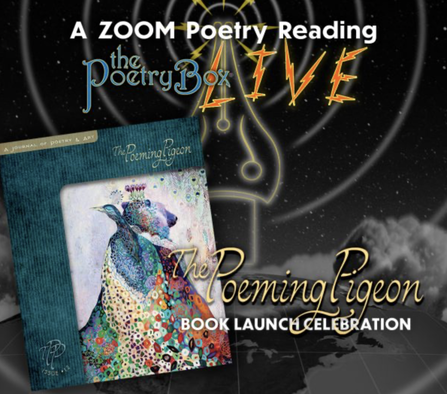
I have very exciting news.
It started as a disappointment, my in-person poetry reading for November 13 was canceled due to health concerns of one of the editors. However, they have decided to go with a Zoom Reading for Issue 12 of The Poeming Pigeon on Saturday, December 10 at 4:00 PST. I will be sending out the information as soon as I get a hold of it. I’m excited because now my online poetry friends will be able to tune in. |
AuthorAll photos and poems in these blog posts are copyrighted to Jone Rush MacCulloch 2006- Present. Please do not copy, reprint or reproduce without written permission from me. Categories
All
Archives
July 2024
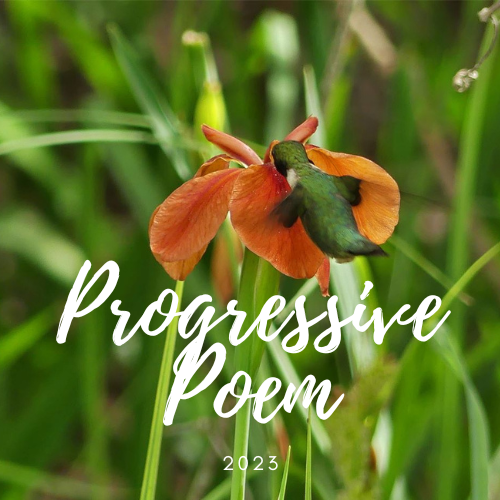
2023 Progressive Poem
April 1 Mary Lee Hahn, Another Year of Reading April 2 Heidi Mordhorst, My Juicy Little Universe April 3 Tabatha, The Opposite of Indifference April 4 Buffy Silverman April 5 Rose Cappelli, Imagine the Possibilities April 6 Donna Smith, Mainely Write April 7 Margaret Simon, Reflections on the Teche April 8 Leigh Anne, A Day in the Life April 9 Linda Mitchell, A Word Edgewise April 10 Denise Krebs, Dare to Care April 11 Emma Roller, Penguins and Poems April 12 Dave Roller, Leap Of Dave April 13 Irene Latham Live You Poem April 14 Janice Scully, Salt City Verse April 15 Jone Rush MacCulloch April 16 Linda Baie, TeacherDance April 17 Carol Varsalona, Beyond Literacy Link April 18 Marcie Atkins April 19 Carol Labuzzetta at The Apples in My Orchard April 20 Cathy Hutter, Poeturescapes April 21 Sarah Grace Tuttle, Sarah Grace Tuttle’s Blog, April 22 Marilyn Garcia April 23 Catherine, Reading to the Core April 24 Janet Fagal, hosted by Tabatha, The Opposite of Indifference April 25 Ruth, There is no Such Thing as a God-Forsaken Town April 26 Patricia J. Franz, Reverie April 27 Theresa Gaughan, Theresa’s Teaching Tidbits April 28 Karin Fisher-Golton, Still in Awe Blog April 29 Karen Eastlund, Karen’s Got a Blog April 30 Michelle Kogan Illustration, Painting, and Writing |
